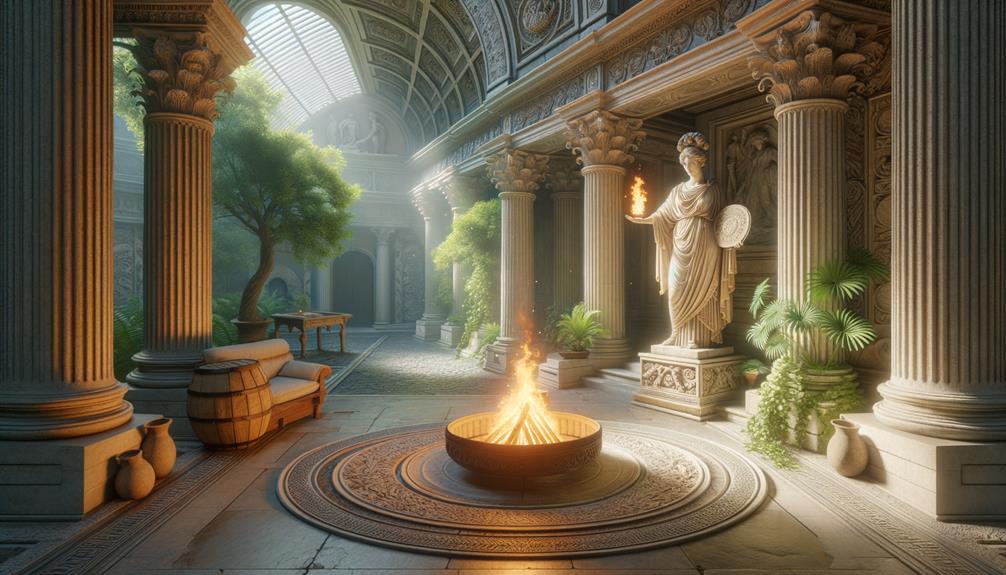When I contemplate Vesta, the ancient Roman Goddess of the Hearth and Home, I'm drawn to the sacred flames she safeguards – an enduring symbol of warmth and stability at the heart of every household. Her pure, chaste essence personifies the archetypal guardian, ensuring prosperity and unity within the domestic sphere. The Vestal Virgins, her devoted attendants, tended this eternal flame, bridging the divine realm with the earthly domain of the home. Yet, what deeper mysteries lie hidden within Vesta's myths and the rituals honoring her? What untold stories do the flickering flames of her hearth conceal, waiting to be unveiled?
Origins of Vesta
In the chronicles of Roman mythology, Vesta emerged as Saturn and Ops' firstborn child, heralding a new era amid her father's downfall. Born into chaos, the Roman goddess symbolized the hearth and sacred fire of the home. Her birth marked continuity; amidst upheaval, order and sanctity prevailed.
As Jupiter, Neptune, Pluto, Juno, and Ceres' eldest sibling, Vesta stood at the vanguard of a divine lineage. Her presence proved pivotal during Jupiter's overthrow of Saturn, signifying a power shift and new dawn. Unlike her Greek counterpart Hestia, Vesta's identity deeply intertwined with the household, embodying the sacred flame uniting families.
Her steadfast chastity and purity, with no offspring, underscored her divine status. Vesta guarded the hearth, the eternal flame symbolizing domestic stability and sacred duty, ensuring Saturn and Ops' legacy endured.
Symbols and Depictions
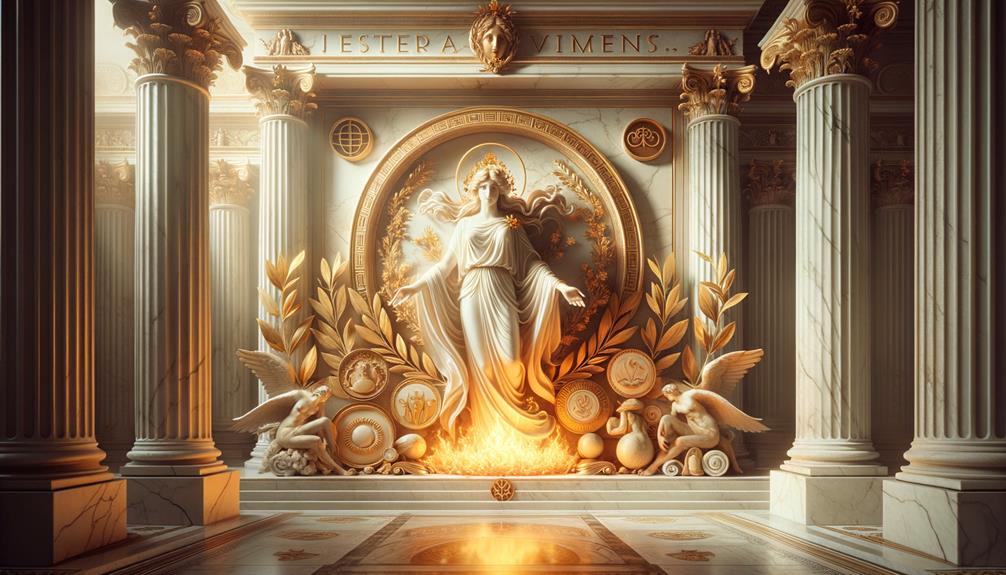
As the Roman goddess of the hearth, Vesta's presence radiates through the warmth of the fireplace. Her imagery and depictions reveal her role as guardian of the sacred flame and protector of the home. Roman art portrays Vesta as a modestly dressed woman, embodying purity and domestic tranquility. She is often accompanied by her sacred animal, the donkey, representing the humble labor required to maintain a household.
Vesta holds a special status as the patron of bakers. Her association with ovens and millstones, frequently turned by donkeys, highlights her connection to sustaining the home with nourishment. This imagery underscores her pivotal role in the kitchen and her broader influence over the hearth as a life-giving source of warmth.
Linked to fire deities like Cacus and Caca, Vesta's paramount duty is preserving the sacred flame. The eternal flame she guards symbolizes the continuity and stability of Roman society and family life. Artistic representations depict her as a serene custodian, embodying the essence of devotion and worship in daily Roman life, both physically and spiritually protecting the home.
Worship and Rituals
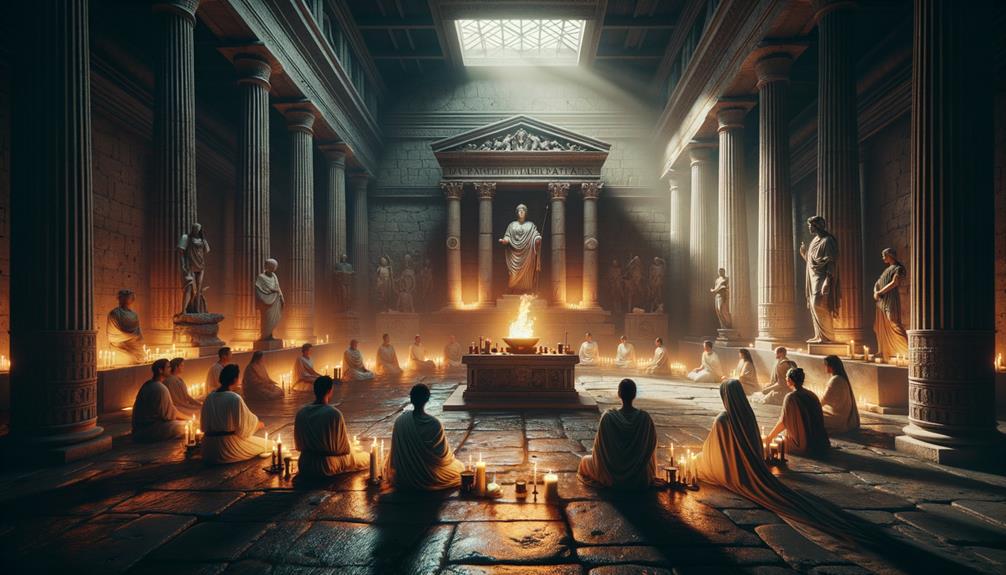
Rituals honoring Vesta connect us to the sacred hearth, invoking the interplay of flame and spirit that nurtures the home and heart. Annually from June 7-15, the Vestalia festival unravels, a profound journey into Roman religious traditions. Reverent matrons, barefoot, step into Vesta's sacred inner sanctuary. They perform rites to ward off potential misfortune, as these days hold vulnerability.
On the final day, a sweeping ritual cleanses the Temple of Vesta of any lingering negativity. The sweepings aren't discarded carelessly; they're meticulously disposed along the Clivus Capitolinus or into the Tiber, ensuring ill omens disperse from the holy space.
These Vestalia practices, integral to venerating the Goddess Vesta, highlight the hearth's vital role in Roman life. Through ancient observances, we profoundly connect with the eternal flame, the spirit of home, and sacred cycles of purification and renewal.
The Vestal Virgins
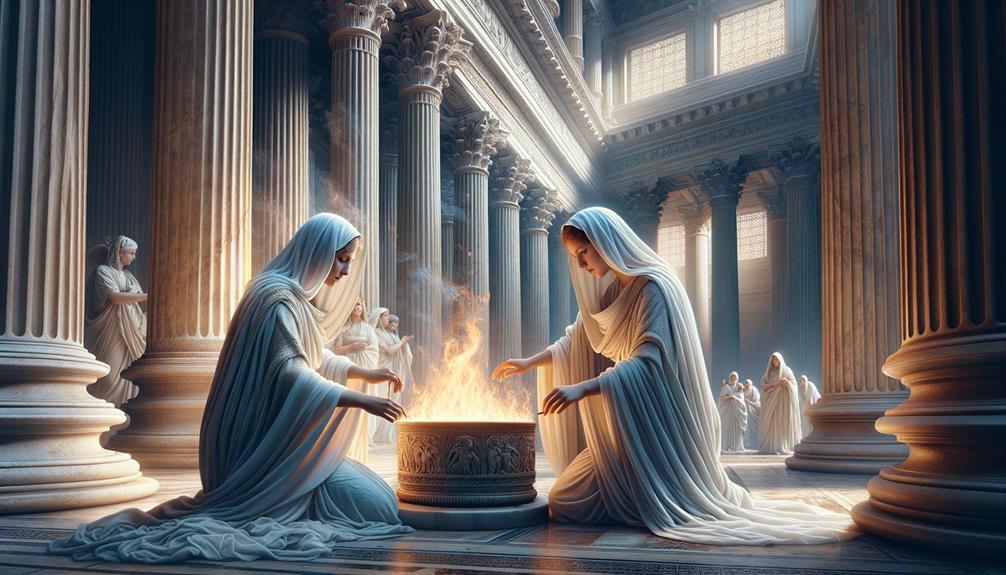
The sacred Vestal Virgins, chosen from noble Roman families, committed three decades of their lives to safeguarding an eternal flame within the Atrium Vestae. Their task symbolized Rome's enduring strength and stability. These priestesses took binding vows of chastity, their pure virtue guarded by severe consequences should they falter. Under the Pontifex Maximus' watchful eye, their ritualistic duties unfolded with precision.
From innocent maidens to wise women, the Vestals transformed through sacrifice and ceremony. Maintaining the sacred fire demanded meticulous rituals to ensure its perpetual burn. Within the Atrium Vestae's hallowed walls, mortal and divine realms converged.
Embodying Rome's heart, the Vestal Virgins stood as living emblems of steadfast dedication. Their mythical legacy endures as a powerful representation of purity and sacred guardianship.
Vesta's Myths and Legends
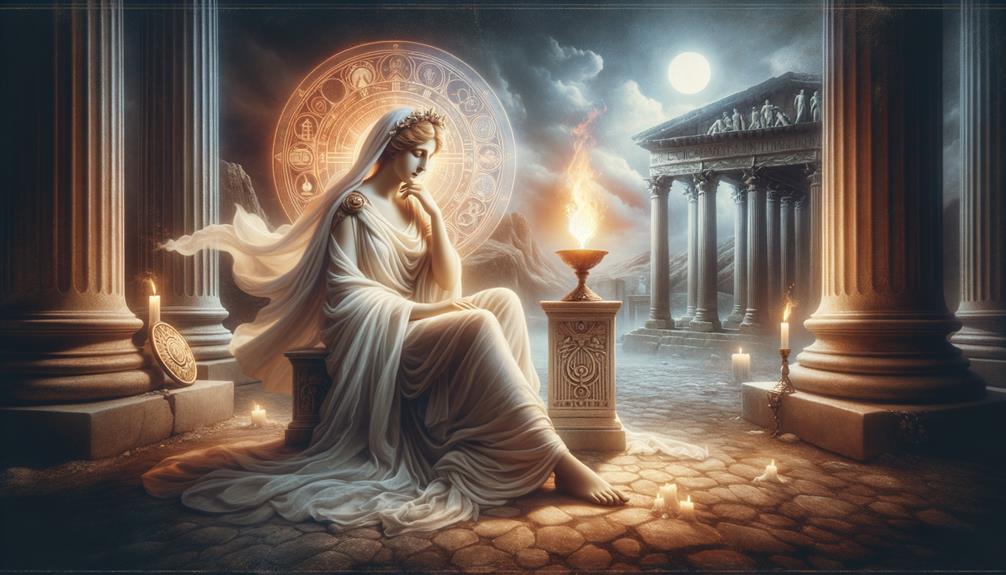
Vesta's myths intertwine purity and sacred flames – she eternally shields hearths and homes. In Roman lore, Vesta oversaw altars and communal hearths, ensuring the eternal flame, symbolizing society's core, persisted.
Stories depict Vesta's devotion to sacred duties. Her presence in households alongside household gods promised protection and prosperity. Vesta's worship pervaded daily domestic rituals. Through her, the hearth became a revered focal point.
Vesta's purity and chastity narratives parallel Rome's enduring unity and strength. Her eternal flame represents collective well-being and the divine-mortal connection.
Frequently Asked Questions
Who Is the Goddess Vesta of the Hearth and Home?
I approach the sacred flame, where Vesta, the timeless keeper of hearth and home, abides. She represents warmth, unity, and protection, embodying domestic harmony's essence and life's unwavering fire.
Who Is the Goddess of Hearth of Home?
For generations, the hearth stood as a beacon of warmth and togetherness in ancient households, with families gathering around its gentle glow. As the guardian of this sacred space, I guide loved ones through life's twists and turns, fostering an unbreakable bond and a cozy sanctuary within every home's walls.
Where Does Vesta Live?
Vesta's essence lives in the warm, cozy hearths found in homes across the land. From grand temples to humble abodes, her flickering flames symbolize unity and the welcoming spirit of domesticity. Families gather around the hearth, finding comfort in Vesta's nurturing glow that illuminates shared moments and memories.
Who Is the Goddess of the Hearth Home Family?
In tales of old, Vesta stood as the everlasting flame, the heart of every Roman dwelling. She embodied the warmth, togetherness, and consecrated order found within family homes. As the goddess of the hearth, Vesta represented a household's unity and sacred bonds.

